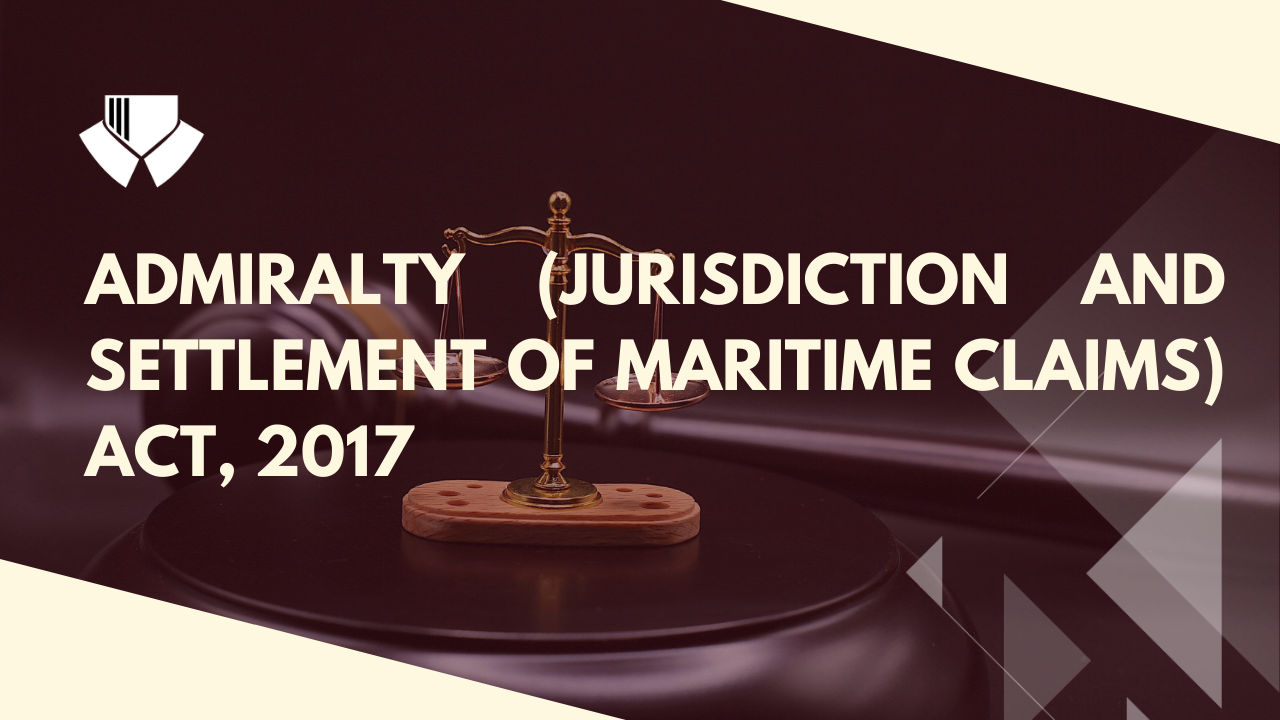This blog is written by Sagili Bhavana Shree, a 2nd year student at Damodaram Sanjivayya National University.
INTRODUCTION
The Admiralty (Jurisdiction and Settlement of Maritime Claims) Act, 2017, serves as a unifying legislation aimed at consolidating the diverse legal aspects pertaining to admiralty jurisdiction. This comprehensive act addresses a spectrum of issues encompassing legal proceedings linked to vessels, their apprehension, confinement, disposal, and associated facets. These provisions are intricately woven to encapsulate matters either directly related to maritime subjects or tangentially associated with them.
In an era of escalating globalization, wherein maritime trade assumes a pivotal role, the Indian government has demonstrated proactive responsiveness. Over recent years, a concerted effort has been undertaken to modernize and overhaul the antiquated legal doctrines regulating maritime affairs and claims within India’s purview. The Admiralty Act of 2017 emerges as a direct outcome of this endeavor, signifying a consolidated legal framework that aspires to streamline maritime legal proceedings.
This legislation not only acknowledges the intricate interplay of maritime elements but also underscores the necessity to address them cohesively. By establishing a comprehensive regulatory structure, the act signifies India’s commitment to align with contemporary international standards in maritime legal practice. In essence, the Admiralty Act stands as a testament to India’s dedication to nurturing its maritime ecosystem in consonance with the evolving dynamics of global trade and commerce
BACKGROUND
The Admiralty Jurisdiction Act serves as a pivotal legislative measure that not only annuls but also supplants a multitude of antiquated statutes pertaining to the admiralty jurisdiction of the Indian High Courts. These erstwhile laws, originally enacted during the 1800s by the British colonial administration, had effectively imposed the framework of British admiralty law upon India. However, given the seismic shifts in global dynamics, particularly the escalating significance of maritime trade in a progressively interconnected world, the Indian government has been galvanized into substantive action.
This comprehensive legislative overhaul signifies a deliberate departure from the inherited legal norms that no longer adequately address the intricacies of contemporary maritime commerce and affairs. By rescinding the obsolete laws and erecting a modernized legislative edifice, the Admiralty Jurisdiction Act stands as a testament to India’s resolve to harmonize its legal framework with the dynamic demands of the present global maritime landscape. This decisive step is reflective of India’s commitment to optimizing its maritime potential while fostering an environment conducive to international trade and maritime interactions.
OBJECT AND PURPOSE OF THE LAW
Before the introduction of the Admiralty Jurisdiction Act, the former British legislative constructs allocated admiralty jurisdiction exclusively to the High Courts of Bombay, Madras, and Calcutta. Despite certain pronouncements by Indian courts implying the expansion of admiralty jurisdiction to other High Courts after India’s independence, this extension was never explicitly codified in any legal statute.
The Act has been established with a twofold objective: to accommodate the burgeoning maritime trade and to establish a structured regulatory framework for its effective oversight. This legislative evolution acknowledges the evolving global maritime dynamics and seeks to rectify the absence of a coherent legal framework that spans across all Indian High Courts. By deliberately articulating the parameters of admiralty jurisdiction, the Act endeavors to enhance legal clarity and predictability in matters pertaining to maritime claims and proceedings across the nation. This transformative step not only signifies India’s dedication to fostering maritime trade but also underscores its commitment to aligning with contemporary legal principles in the maritime domain.
PROVISIONS OF THE LAW
| S.NO | IMPORTANT PROVISIONS | EXPLANATION |
| 1) | Establishment of Admirality Jurisdiction | Defines the scope of Admirality Courts. |
| 2) | Procedure for Arrest and Sale Of Ships | Outlines the Procedure for the arrest and sale of ships in maritime claims. |
| 3) | Jurisdiction of High Court & Other Courts | Specifies the Jurisdiction of High Courts & other courts in maritime claims. |
PENAL PROVISIONS
| S.NO. | PENAL PROVISIONS | EXPLANATION |
| 1) | Maritime Pollution | Fine or Imprisonment for some Years as per the jurisdiction. If found liable polluting the Marine Water Bodies. |
| 2) | Privacy | Life Imprisonment or Fine can be imposed in case breaching the privacy of the Maritime Policies. |
| 3) | Smuggling | If the Marine Water Bodies are used to smuggle illegal substances or objects, the person violating the law will be held liable of fine or imprisonment. |
| 4) | Violation of Maritime Regulations | Person not abiding by the rules & regulations will be held liable and punishable for fine or imprisonment. |
| 5) | Murder or Assault at Sea | If an assault or murder happens on the sea it is punishable as life imprisonment according to this act. |
SIGNIFICANCE OF THE ACT
The long-awaited Admiralty Jurisdiction Act serves as a vital legal enactment. It brings lucidity to the jurisdiction of Indian courts in admiralty cases and consolidates within a single statute much of the content that was formerly confined to judicial pronouncements. With the implementation of this Act, it will become a valued point of reference for courts handling admiralty disputes. Given the alterations introduced by the Act, it would be judicious to review maritime documents such as bills of lading, charter party agreements, service contracts, contracts of affreightment, and documents linked to services at different ports to ensure their alignment with the newly established legal framework.
CRITICISM AND LIMITATIONS
- Admiralty law has faced criticism on several fronts. One primary concern is its complexity and lack of uniformity across jurisdictions, which can lead to confusion and inconsistency in legal outcomes. The procedural intricacies and specialized terminology can also present barriers to access for non-experts, potentially undermining justice.
- Additionally, admiralty law’s historical roots and focus on maritime commerce have been criticized for not adequately addressing modern challenges such as environmental protection and human rights concerns arising from maritime activities.
- The enforcement of judgments and international cooperation in admiralty cases can be arduous due to differing legal systems and sovereign interests. Furthermore, some argue that admiralty law tends to prioritize economic interests over environmental sustainability and social welfare. These criticisms highlight the need for ongoing reforms in admiralty law to ensure fairness, clarity, and responsiveness to contemporary issues in an increasingly globalized maritime environment.
CONCLUSION
The newly adopted Act of 2017 removed many antiquated British rules that governed India’s maritime interactions and claims. In addition, every judgment, decree, or order issued by a single judge of the high court may be appealed to a division bench of the high court, and the federal government must select a list of assessors to assist the judge in evaluating rates and claims in admiralty procedures. Given the enactment of the Admiralty Act of 2017, it would be smart to re-examine shipping documentation to ensure that they are in accordance with the new law.


